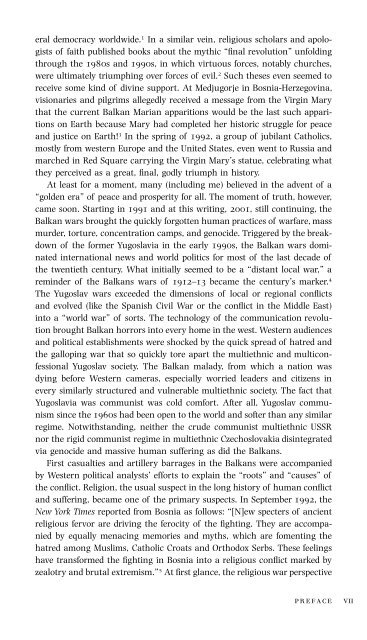Balkan Idols: Religion and Nationalism in Yugoslav States
Balkan Idols: Religion and Nationalism in Yugoslav States
Balkan Idols: Religion and Nationalism in Yugoslav States
Create successful ePaper yourself
Turn your PDF publications into a flip-book with our unique Google optimized e-Paper software.
eral democracy worldwide. 1 In a similar ve<strong>in</strong>, religious scholars <strong>and</strong> apologists<br />
of faith published books about the mythic “f<strong>in</strong>al revolution” unfold<strong>in</strong>g<br />
through the 1980s <strong>and</strong> 1990s, <strong>in</strong> which virtuous forces, notably churches,<br />
were ultimately triumph<strong>in</strong>g over forces of evil. 2 Such theses even seemed to<br />
receive some k<strong>in</strong>d of div<strong>in</strong>e support. At Medjugorje <strong>in</strong> Bosnia-Herzegov<strong>in</strong>a,<br />
visionaries <strong>and</strong> pilgrims allegedly received a message from the Virg<strong>in</strong> Mary<br />
that the current <strong>Balkan</strong> Marian apparitions would be the last such apparitions<br />
on Earth because Mary had completed her historic struggle for peace<br />
<strong>and</strong> justice on Earth! 3 In the spr<strong>in</strong>g of 1992, a group of jubilant Catholics,<br />
mostly from western Europe <strong>and</strong> the United <strong>States</strong>, even went to Russia <strong>and</strong><br />
marched <strong>in</strong> Red Square carry<strong>in</strong>g the Virg<strong>in</strong> Mary’s statue, celebrat<strong>in</strong>g what<br />
they perceived as a great, f<strong>in</strong>al, godly triumph <strong>in</strong> history.<br />
At least for a moment, many (<strong>in</strong>clud<strong>in</strong>g me) believed <strong>in</strong> the advent of a<br />
“golden era” of peace <strong>and</strong> prosperity for all. The moment of truth, however,<br />
came soon. Start<strong>in</strong>g <strong>in</strong> 1991 <strong>and</strong> at this writ<strong>in</strong>g, 2001, still cont<strong>in</strong>u<strong>in</strong>g, the<br />
<strong>Balkan</strong> wars brought the quickly forgotten human practices of warfare, mass<br />
murder, torture, concentration camps, <strong>and</strong> genocide. Triggered by the breakdown<br />
of the former <strong>Yugoslav</strong>ia <strong>in</strong> the early 1990s, the <strong>Balkan</strong> wars dom<strong>in</strong>ated<br />
<strong>in</strong>ternational news <strong>and</strong> world politics for most of the last decade of<br />
the twentieth century. What <strong>in</strong>itially seemed to be a “distant local war,” a<br />
rem<strong>in</strong>der of the <strong>Balkan</strong>s wars of 1912–13 became the century’s marker. 4<br />
The <strong>Yugoslav</strong> wars exceeded the dimensions of local or regional conflicts<br />
<strong>and</strong> evolved (like the Spanish Civil War or the conflict <strong>in</strong> the Middle East)<br />
<strong>in</strong>to a “world war” of sorts. The technology of the communication revolution<br />
brought <strong>Balkan</strong> horrors <strong>in</strong>to every home <strong>in</strong> the west. Western audiences<br />
<strong>and</strong> political establishments were shocked by the quick spread of hatred <strong>and</strong><br />
the gallop<strong>in</strong>g war that so quickly tore apart the multiethnic <strong>and</strong> multiconfessional<br />
<strong>Yugoslav</strong> society. The <strong>Balkan</strong> malady, from which a nation was<br />
dy<strong>in</strong>g before Western cameras, especially worried leaders <strong>and</strong> citizens <strong>in</strong><br />
every similarly structured <strong>and</strong> vulnerable multiethnic society. The fact that<br />
<strong>Yugoslav</strong>ia was communist was cold comfort. After all, <strong>Yugoslav</strong> communism<br />
s<strong>in</strong>ce the 1960s had been open to the world <strong>and</strong> softer than any similar<br />
regime. Notwithst<strong>and</strong><strong>in</strong>g, neither the crude communist multiethnic USSR<br />
nor the rigid communist regime <strong>in</strong> multiethnic Czechoslovakia dis<strong>in</strong>tegrated<br />
via genocide <strong>and</strong> massive human suffer<strong>in</strong>g as did the <strong>Balkan</strong>s.<br />
First casualties <strong>and</strong> artillery barrages <strong>in</strong> the <strong>Balkan</strong>s were accompanied<br />
by Western political analysts’ efforts to expla<strong>in</strong> the “roots” <strong>and</strong> “causes” of<br />
the conflict. <strong>Religion</strong>, the usual suspect <strong>in</strong> the long history of human conflict<br />
<strong>and</strong> suffer<strong>in</strong>g, became one of the primary suspects. In September 1992, the<br />
New York Times reported from Bosnia as follows: “[N]ew specters of ancient<br />
religious fervor are driv<strong>in</strong>g the ferocity of the fight<strong>in</strong>g. They are accompanied<br />
by equally menac<strong>in</strong>g memories <strong>and</strong> myths, which are foment<strong>in</strong>g the<br />
hatred among Muslims, Catholic Croats <strong>and</strong> Orthodox Serbs. These feel<strong>in</strong>gs<br />
have transformed the fight<strong>in</strong>g <strong>in</strong> Bosnia <strong>in</strong>to a religious conflict marked by<br />
zealotry <strong>and</strong> brutal extremism.” 5 At first glance, the religious war perspective<br />
preface vii


